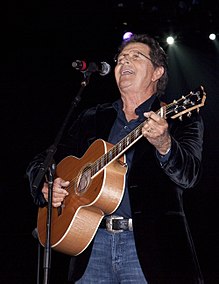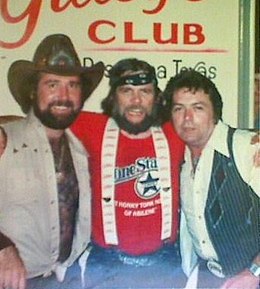Uploaded on Jan 22, 2008
Mac Davis performs on The Johnny Cash Show, Oct. 14, 1970. Includes "I Believe In Music"
Mac Davis (born January 21, 1942) is a country music singer, songwriter, and actor originally from Lubbock, Texas, who has enjoyed much crossover success.
His early work writing for Elvis Presley
produced multiple number-one hits (including "Memories", "In The
Ghetto", and the latently popular "A Little Less Conversation"), and a
subsequent solo career in the late 1970s made him a well-known name in
pop music. He has starred in his own variety show, a Broadway musical,
and various films.
| Mac Davis | |
|---|---|
 Mac Davis performing at the Alabama Music Hall of Fame Concert 2010 |
|
| Background information | |
| Birth name | Morris Mac Davis |
| Born | January 21, 1942 |
| Origin | Lubbock, Texas, U.S. |
| Genres | Country Music/Pop Music |
| Occupations | singer/songwriter/actor |
| Instruments | Vocals Guitar |
| Years active | 1970–present |
| Labels | Columbia, Casablanca, MCA |
| Associated acts | Nancy Sinatra, Kenny Rogers, Dolly Parton, Elvis Presley, Crystal Gayle, Irving Berlin |
Career as a songwriter
Davis initially became famous as a songwriter and got his start as an employee of Nancy Sinatra's company, Boots Enterprises, Inc. Davis was with Boots for several years in the late 1960s. During his time there, he played on many of Sinatra's recordings and she put him in her stage shows.Boots Enterprises was also Davis' publishing company, publishing songs such as "In the Ghetto", "Friend, Lover, Woman, Wife", "Home", "It's Such a Lonely Time of Year", and "Memories", which were recorded by Elvis Presley, Nancy Sinatra and others. Davis left Boots Enterprises in 1970 to sign with Columbia Records, taking his songs with him.
He became known later also as a country singer. Especially during the 1970s, many of his songs scored successfully on the country and popular music charts, including "Baby, Don't Get Hooked on Me" (a number one success), "One Hell of a Woman" (Popular No. 11), and "Stop and Smell the Roses" (a No. 9 Popular hit). During the 1970s, he also was active as an actor, hosting his own variety show and also acting in several movies.
Though Davis was physically small, he had a penchant for getting into fistfights. "In those days, it was all about football, rodeo and fistfights. Oh, man, I got beat up so much while I was growing up in Lubbock," Davis said in a March 2, 2008, interview with the Lubbock Avalanche-Journal newspaper. "I was 5 feet, 9 inches, and weighed 125 pounds. I joined Golden Gloves, but didn't do good even in my division." After he finished high school, Davis moved to Atlanta, Georgia, where his mother lived.[1]
In Atlanta, Davis played rock and roll music. He also worked for the Vee Jay record company (home to R&B stars such as Gene Chandler, Jerry Butler and Dee Clark) as a regional manager, and later also served as a regional manager for Liberty Records. In the meantime, Davis was also writing songs. One of the songs he wrote in 1968, called "A Little Less Conversation" was recorded by Elvis Presley (and would become a posthumous success for Presley years later).
Shortly after, Presley recorded Davis' song "In the Ghetto" in his sessions in Memphis. According to maverick record producer Jimmy Bowen, "Ghetto" was originally pitched to Sammy Davis, Jr.. Mac, guitar in hand, played the song in a studio, with onlookers such as Rev. Jesse Jackson and other members of the black activist community. Davis, the only Caucasian man in the room at the time, would eventually tell Bowen, "I don't know whether to thank ya, or to kill ya."
Davis eventually recorded the tune after Presley's version became a success, and was released in a Ronco "In Concert" compilation in 1975. It was later released on a campy Rhino Records "Golden Throats" compilation in 1991. The song became a success for Presley and he continued to record more of Davis' material, such as "Memories" and "Don't Cry Daddy". Bobby Goldsboro also recorded some of Davis's songs, including "Watching Scotty Grow", which became a number one Adult Contemporary success for Goldsboro in 1971.
Other artists who recorded his material included Vikki Carr, O.C. Smith and Kenny Rogers and The First Edition. "I Believe in Music", often considered to be Davis's signature song, was recorded by several artists (including Marian Love, B.J. Thomas, Louis Jordan, Perry Como, Helen Reddy and Davis himself) before it finally became a success in 1972 for the group Gallery.
Success as a singer
Davis soon decided to pursue a career of his own in country music; he was signed to Columbia Records in 1970. His big success in his own right, after several years of enriching the repertoires of other artists, came two years after he was signed to Columbia, when he topped the Country and Pop charts with the success song "Baby Don't Get Hooked on Me." It sold over one million copies, and was awarded a gold disc by the Recording Industry Association of America (RIAA) in September 1972.[2]
Some of Davis's lyrics invoked overtly sexual relationships. "Baby Don't Get Hooked on Me" (in which he pleads with a woman not to become too enamored of him, because he does not want to commit to a full-time relationship with her) was an example, as were other successful songs, such as "Naughty Girl" and "Baby Spread Your Love on Me." He was far from being alone in this respect; many country songs that were popular during the 1970s and 1980s also featured sexual themes.
During 1974, Davis was awarded the Academy of Country Music's Entertainer of the Year award. Some of Davis's other successes included "Stop and Smell the Roses" (a number one Adult Contemporary success in 1974) (Popular No. 9), "One Hell of a Woman" (Pop No. 11), and "Burnin' Thing" (Popular No. 53). At the end of the 1970s, he moved to Casablanca Records, which, though it was now vending country music, was best known at the time primarily for its successes with disco diva Donna Summer and rockers Kiss. His first success for the company in 1980 was the novelty song "It's Hard To Be Humble," a light-hearted look at how popularity and/or good looks could go to one's head, which became his first country music Top 10.
He also had another Top 10 song with "Let's Keep It That Way" later in the year. He achieved other successful songs, such as "Texas In My Rear View Mirror" and "Hooked on Music," which became his biggest country music success in 1981, going to No. 2. In 1985, he recorded his (to date) last Top Ten country music success with the song "I Never Made Love (Till I Made Love With You)".
On January 19, 1985, Davis performed "God Bless the USA" at the 50th Presidential Inaugural Gala, held the day before the second inauguration of Ronald Reagan.
Source: Wikipedia
TTFN
CYA Later Taters
Thanks for watching.
Donnie/ Sinbad the Sailor Man






